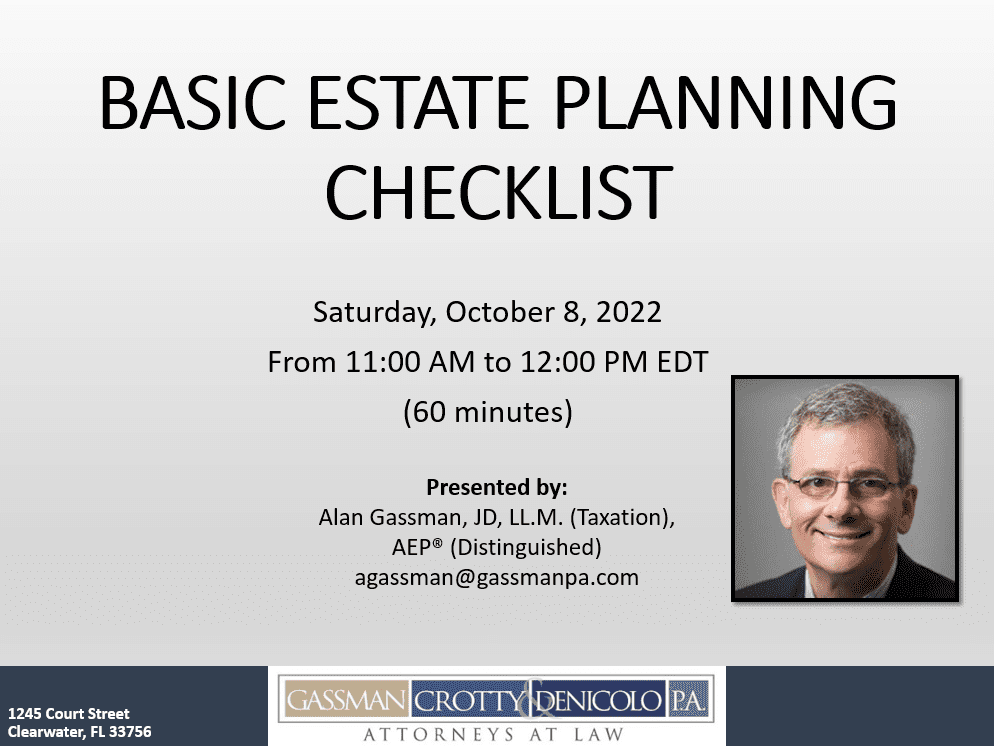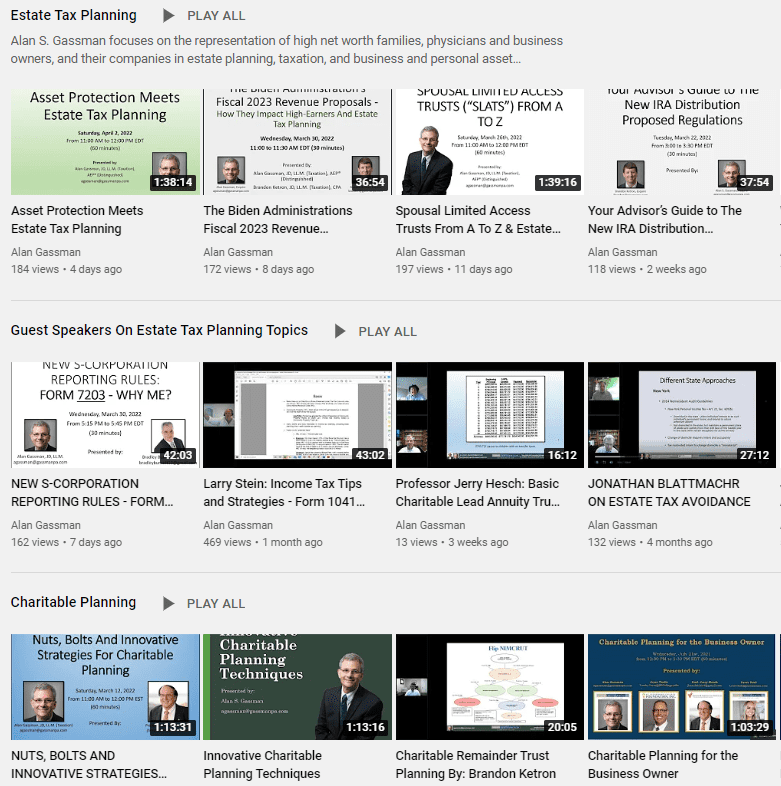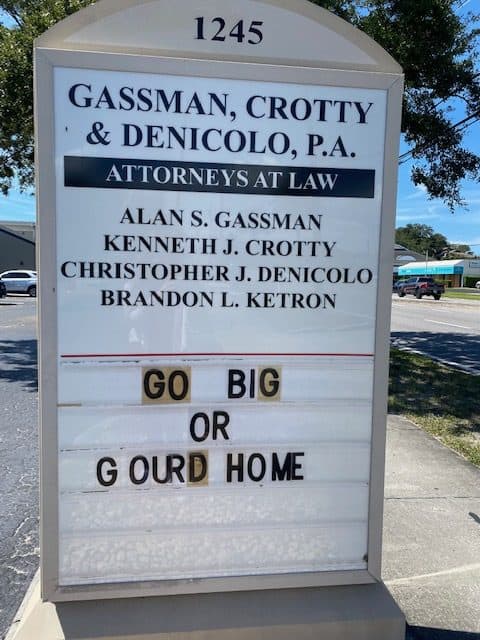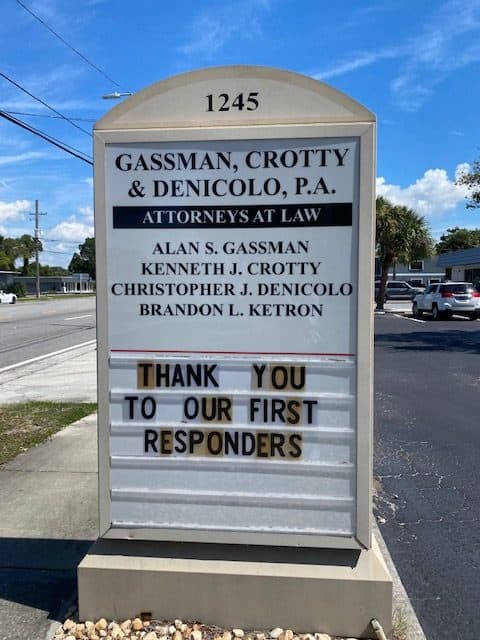After Storm Planning & Noodles – The Thursday Report – Issue 330
|
|
|||||||||||||||||||||||||||||||||||||||||||||||||||||||||||||||||||||||||||||||||||||||||
|
|
|||||||||||||||||||||||||||||||||||||||||||||||||||||||||||||||||||||||||||||||||||||||||
|
|
|||||||||||||||||||||||||||||||||||||||||||||||||||||||||||||||||||||||||||||||||||||||||
|
Tuesday, October 4, 2022Things You Can Noodle On – Issue #330
Coming from the Law Offices of Gassman, Crotty & Denicolo, P.A. in Clearwater, FL. Edited By: Ken Crotty Having trouble viewing this? Use this link
|
|||||||||||||||||||||||||||||||||||||||||||||||||||||||||||||||||||||||||||||||||||||||||
|
Please Note: Gassman, Crotty, & Denicolo, P.A. will be sending the Thursday Report out during the first week of every month. Article 1Hurricane Ian Tax ReliefWritten By: Ken Crotty, J.D., LL.M. Article 2If a Client Needs to File a Gift Tax Return for 2021, the Market Down Turn May Present a Planning OpportunityWritten By: Article 3Employment Issues in the Event of a HurricaneWritten By: Colleen M. Flynn Forbes CornerA Guide To Tax Planning For Victims Of Hurricane Ian And Other DisastersWritten By: Alan Gassman, JD, LL.M. (Taxation), AEP® (Distinguished) For Finkel’s FollowersYou Need To Start Owning Your Mistakes and FailuresWritten By: David Finkel Free Saturday WebinarBasic Estate Planning ChecklistPresented By: Alan Gassman More Upcoming EventsYouTube LibraryHumor
|
|||||||||||||||||||||||||||||||||||||||||||||||||||||||||||||||||||||||||||||||||||||||||
|
Article 1Hurricane Ian Tax Relief
Written By: Ken Crotty, J.D., LL.M. On September 29, 2022, the Federal Emergency Management Agency (“FEMA”) declared a major disaster in the state of Florida, affecting all 67 counties. Please click here to read a copy of the FEMA notice, as amended. As a result of the disaster declaration, the IRS announced that certain tax filing and tax payment deadlines which are or were due between September 23, 2022 and February 15, 2023, are automatically extended through February 15, 2023, so as not to spoil any Lady and the Tramp Valentine’s Day meals. Cick here for the notice from the IRS. Filing and payment relief is available for individuals who live in Florida and businesses (including tax-exempt organizations) whose principle place of business is located in Florida. The relief also applies to taxpayers who are not located in Florida, but who have records located in Florida that are necessary to meet the required tax filing and/or compliance. Relief workers who are helping in Florida and are affiliated with recognized governmental or philanthropic organizations are also entitled to relief. Estates and Trusts that have tax records in Florida also qualify for the relief. The complete list of taxpayers eligible for relief are listed in Treasury Regulation § 301.7508A-1(d)(1). Click here to view. This relief applies to all personal income tax returns that were extended in April to October 17, 2022. However, because any payments related to an individual’s 2021 personal income tax return were due on April 18, 2022, the requirement to make any such payments has not been extended. No spaghetti model is likely to change that. Unlike making noodles from scratch the way your great-grandmother used to, there is nothing a person residing in Florida needs to do to qualify for this relief as an individual tax payer. In addition, the relief also extends the time to file estate tax, gift tax, and generation skipping tax returns that would otherwise be due during this period to February 15, 2023. The extension to February 15, 2023 also applies to (1) quarterly estimated tax payments which would normally be due on January 12, 2023, and (2) quarterly payroll and excise tax returns which would have otherwise been due on October 31, 2022 and January 31, 2023. The IRS also if providing relief by abating penalties on payroll and excise tax deposits that are or were due between September 23, 2022 and October 10, 2022, so long as such deposit amounts are paid on or before October 10, 2022. Just like how garlic bread goes so well with fettuccine alfredo, the Florida Department of Revenue (“DOR”) often extends filing deadlines and requirements when the IRS does. We spoke with a representative at the DOR on the morning of October 3, 2022. She stated that no official extension or relief had been granted by the DOR with respect to Florida filings as of our conversation, but that the DOR usually does issue a blanket extension or relief when the IRS does. She advised that businesses should contact the DOR directly for a review and extension approval, as this is currently being given on a case-by-case basis after review, in the event that the DOR does not issue a blanket extension or relief in the future. |
|||||||||||||||||||||||||||||||||||||||||||||||||||||||||||||||||||||||||||||||||||||||||
|
Article 2If a Client Needs to File a Gift Tax Return for 2021, the Market Down Turn May Present a Planning Opportunity
Written By: Ken Crotty, J.D., LL.M. Many clients made large taxable gifts in 2021 which require a Gift Tax Return to be filed. A client’s Gift Tax Return is due when the client’s personal Income Tax Return is due, which is typically by April 15th each year. Many clients request an automatic extension of time to file the Gift Tax Return. For most taxpayers, an extended 2021 Gift Tax Return is due on October 17th. However, as described above, because of the disaster designation by FEMA, Florida residents now have until February 15, 2023 to file their 2021 Gift Tax Returns. Because of the market down turn, some client’s may be better served filing their Gift Tax Return this month, rather than waiting until February 2023. Most people are familiar are familiar with the lifetime gift tax applicable exclusion amount (“Gift Exclusion Amount”), which is currently $12,060,000 for 2022. The Gift Exclusion Amount will be increased to take into account inflation through 2025. When a client makes a taxable gift during his or her lifetime, the gift is reported on a Gift Tax Return. On the Gift Tax Return, the client reports the usage of some of his or her Gift Exclusion Amount so that the client does not need to actually pay tax to the IRS related to the gift. By means of example, in 2021, the Gift Exclusion Amount was $11,700,000. If a client made a $4,000,000 taxable gift in 2021, the client would need to file a Gift Tax Return reporting this gift and the client’s Gift Exclusion Amount would be reduced from $11,700,000 to $7,700,000, assuming no prior gifts had been made before 2021 by the client. The client can then use this remaining $7,700,000 of Gift Exclusion Amount, as adjusted for inflation, during his or her lifetime to make additional gifts. On the client’s death, the client’s remaining Gift Exclusion Amount is available to shelter the client’s assets from being subject to estate tax. Fewer people are familiar with the Generation Skipping Transfer Tax (“GST Tax”). The GST Tax is a separate tax from the estate tax and from the gift tax. The GST Tax applies to direct transfers to grandchildren and/or more remote beneficiaries and to Trusts which may make distributions to grandchildren and/or more remote beneficiaries. The basic exemption for the GST Tax is the same as the basic Gift Exclusion Amount. Clients also had an $11,700,000 GST Tax exemption in 2021, assuming no prior gifts had been made before 2021 by the client which utilized the client’s GST Tax Exemption. GST Tax exemption is allocated by clients on a Gift Tax Return to gifts that could be subject to GST Tax, similar to how the client’s Gift Exclusion Amount is allocated. By allocating GST Tax exemption to these transfers, no GST Tax needs to be paid on the transfer or on subsequent distributions from a Trust if the gift was made to a Trust. If the allocation is made to a Trust, assuming that the allocation covers all of the monetary value of the gift made by the client to the Trust at the time the allocation is made, then none of the assets of the Trust will ever be subject to GST Tax, no matter how large the Trust grows in the future. For a client who made a gift that was worth more at the time the gift was made than the gift is worth when the Gift Tax Return is filed, the client may want to consider opting out of the automatic allocation of GST Tax exemption. The client can do this by attaching a Notice to the Gift Tax Return that the client is opting out of automatic allocation. The client would then file a second Gift Tax Return, and allocate some of the client’s GST Tax exemption on the second Gift Tax Return. This second Gift Tax Return would not use anymore of the client’s Gift Exclusion Amount, and there is no penalty from making such a late GST Tax exemption allocation. For example, assume (1) a client made a gift of stock to a Trust on December 31, 2021 that was worth $4,000,000 on that date; (2) the client needs to file a Gift Tax Return by October 17, 2022, for it to be timely; and (3) the value of the stock owned by the Trust as of October 1, 2022 was only $3,000,000. The client, on a timely filed Gift Tax Return, could use the automatic allocation rules and allocate $4,000,000 of the client’s GST Tax exemption to the Trust, so that none of the assets of the Trust would ever be subject to GST Tax. However, the client could timely file a Gift Tax Return with the appropriate Notice electing out of the automatic allocation of GST Tax exemption to the Trust. As a result, no GST Tax exemption would be used on the timely filed Gift Tax Return. The client could then file a second Gift Tax Return reporting that the client was allocating GST Tax exemption to the Trust. If this second Gift Tax Return was filed in October, the amount of GST Tax exemption that the client would need to allocate to the Trust so that the assets of the Trust would not be subject to GST Tax would only be $3,000,000 (the value of the Trust on October 1, 2022). In this example, the client would only allocate $3,000,000 in GST Tax exemption instead of $4,000,000 worth of GST Tax exemption with an automatic allocation. As a result, this would allow the client to have an additional $1,000,000 worth of GST tax exemption, which could be allocated to future gifts or used by the client’s estate after the client has passed away. Although this planning opportunity may not be for everyone, for some clients it would be a very effective way of sheltering additional GST Tax exemption instead of wasting the exemption on a gift to a Trust that is worth less now than when it was made in 2021.
|
|||||||||||||||||||||||||||||||||||||||||||||||||||||||||||||||||||||||||||||||||||||||||
|
Article 3Tax Smart Disaster Relief for Your Employees and Families
Written By: Alan Gassman, JD, LL.M, AEP (Distinguished) Many employers and for profit companies are willing and able to provide financial assistance and services to those who have been harmed or dislocated by Hurricane Ian. The Federal Tax Code, IRS Regulations, and IRS Guidance provide ways to make these payments tax deductible for recipients so that the recipients do not have to pay income tax on what they receive. This was covered in my blog post of Saturday, October 1st with reference to direct or indirect payments by an employer to or for the benefit of one or more individuals. One question on the deductibility of such payments is whether they are considered to be reasonable and necessary in the ordinary course of the employer’s business. It is possible that an IRS auditor would conclude that these payments are really more in the order of gifts that would not be tax deductible, unless they can qualify as a charitable contribution. In order to receive a deduction for a charitable contribution, a person or business must make the contribution to an Internal Revenue Code Section 501(c)(3) charity, which may be a public charity, or a private charity. Many individuals and businesses would like to benefit one or more particular people who have been harmed financially or otherwise in a national disaster, and a recent IRS pronouncement confirms that this can be done, as long as the contribution is to a qualified 501(c)(3) organization, and general rules are followed to make it clear that the organization has no legal obligation to spend the funds on any one or more designated people, and is managed for the benefit of an indefinite number of individuals or a large number of individuals, with independent directors, trustees or managers having all decision-making rights, which are to be exercised in a reasonable and responsible manner. Click here to continue reading on Forbes
|
|||||||||||||||||||||||||||||||||||||||||||||||||||||||||||||||||||||||||||||||||||||||||
Forbes Corner
A Guide To Tax Planning For Victims Of Hurricane Ian And Other DisastersWritten By: Alan Gassman, JD, LL.M, AEP (Distinguished)
Tax advisors are already working hard to determine how the IRS disaster relief announcements and Internal Revenue Code will impact disaster victims, and those who reside in disaster areas. While the first thoughts of many are to be able to deduct losses and home remodeling, and to be able to extend… Continue Reading on Forbes. |
|||||||||||||||||||||||||||||||||||||||||||||||||||||||||||||||||||||||||||||||||||||||||
|
For Finkel’s Followers |
|||||||||||||||||||||||||||||||||||||||||||||||||||||||||||||||||||||||||||||||||||||||||
|
Free Saturday WebinarBasic Estate Planning Checklist
Date: Saturday, October 8, 2022 Time: 11:00 AM to 12:00 PM EDT (60 minutes) Presented by: Alan Gassman, JD, LL.M. (Taxation), AEP (Distinguished) Please Note: This is a complimentary webinar program. After registering, you will receive a confirmation email containing information about joining the webinar. Approximately 3-5 hours after the program concludes, the recording and materials will be sent to the email address you registered with. Important: If you are already on the “Register For All Upcoming Free Webinars” list, you will be auto-registered on Friday for non-CPE credit. If you would like 1.0 free CPE Credit for this webinar, please also register above through CPA Academy. Please email registration questions to info@gassmanpa.com.
|
|||||||||||||||||||||||||||||||||||||||||||||||||||||||||||||||||||||||||||||||||||||||||
|
|
|||||||||||||||||||||||||||||||||||||||||||||||||||||||||||||||||||||||||||||||||||||||||
|
All Upcoming Events
|
|||||||||||||||||||||||||||||||||||||||||||||||||||||||||||||||||||||||||||||||||||||||||
|
YouTube Library
Visit Alan Gassman’s YouTube Channel for complimentary webinars and more! The PowerPoint materials can be found in the description box located at the bottom of the YouTube recording. Click here or on the image of the playlists below to go to Alan Gassman’s YouTube Library. |
|||||||||||||||||||||||||||||||||||||||||||||||||||||||||||||||||||||||||||||||||||||||||
|
HumorWhat do you call a fake noodle? An impasta What’s a noodle that only costs one cent? Penne What do you get when you add pool noodles to a hot tub? Spa-ghetti What is a noodle’s favorite bicycle race? The Tour de Lini What’s the WiFi password at a Vietnamese noodle shop? 123pho5 What do you call a scared noodle? Fettuccine Afraid-o!
|
|||||||||||||||||||||||||||||||||||||||||||||||||||||||||||||||||||||||||||||||||||||||||
|
Gassman, Crotty & Denicolo, P.A. 1245 Court Street Clearwater, FL 33756 (727) 442-1200 Copyright © 2021 Gassman, Crotty & Denicolo, P.A
|
|||||||||||||||||||||||||||||||||||||||||||||||||||||||||||||||||||||||||||||||||||||||||
|
|
|||||||||||||||||||||||||||||||||||||||||||||||||||||||||||||||||||||||||||||||||||||||||

















